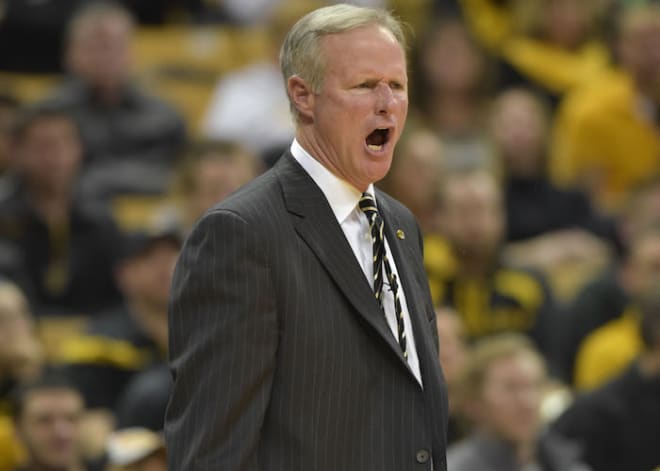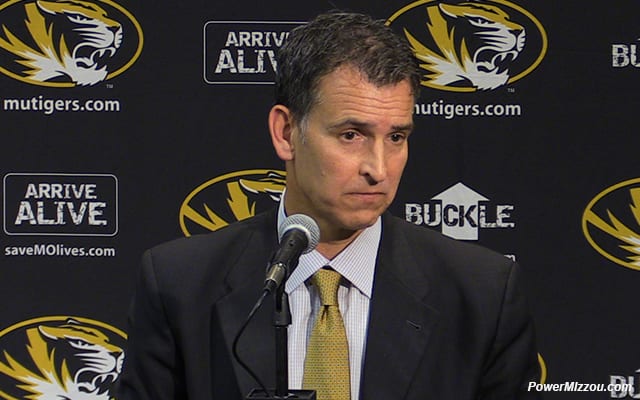Do NCAA sanctions change Anderson's future?
For the last 21 months, the NCAA and the University of Missouri have been investigating violations that occurred in school’s basketball program. It was a stealth operation which very few people knew even existed. One of those people was apparently not current head coach Kim Anderson.
In his remarks to assembled media on Wednesday afternoon, Director of Athletics Mack Rhoades said he was made aware that the program was under NCAA investigation when he was interviewing for the Missouri job. Rhoades was hired on March 8, 2015 nearly 11 full months after Mizzou reports that it received a verbal notice of inquiry from the NCAA on April 14, 2014.
I asked Anderson if he too was made aware of the investigation during the process of interviewing for the job.
“No,” Anderson said.

Frank Haith accepted the head coaching job at Tulsa on April 18, 2014, four days after Mizzou received that inquiry. On April 21--a full week after Mizzou was notified the NCAA was investigating the program--Andy Katz of ESPN.com reported that Anderson was “a strong candidate for the vacant Missouri opening. A week later, he was officially hired. At no point in those 14 days, apparently, did anyone at Missouri tell Anderson that the program he was about to take over was under an NCAA investigation.
To be fair, Anderson said that knowledge would not have impacted his decision. He would have taken the job anyway. At this point, there’s not much else he could say, but let’s take the man at his word and assume he would have returned to his alma mater even if he had known the depths from which he would be asked to dig the program.
Still, one has to wonder, how could Missouri not have told him? It is the equivalent of hiring someone to run a restaurant without telling them the Health Department is threatening to shut it down and his most popular menu items will be taken away for the first two years he runs the place. A source familiar with such situations--but not with Anderson's specifically--told PowerMizzou.com that it would be common courtesy for Mizzou to have disclosed the investigation during the interview process prior to Anderson taking the job.
How could Missouri not have told him? I reached out to Mike Alden, who was the Director of Athletics at the time Anderson was hired, and asked that very question. Alden responded with a text message directing me to University of Missouri Director of Compliance Mary Ann Austin.
“The NCAA had not provided the institution authority to share any information at the time of the Head Men’s Basketball search,” Austin said in an email.
Other Mizzou officials on Wednesday declined to answer questions about the process, saying that they could not speak about an ongoing investigation.
That was the party line of out Missouri today. However, it is not one that is agreed upon by all involved. Scott Tompsett, a Kansas City-based attorney, represents Frank Haith. Haith was Missouri’s head coach at the time of the violations. Tompsett said he was informed last fall that the NCAA investigation was wrapping up and that Haith would not be charged with any wrongdoing. And Haith was not mentioned by name or job title in Missouri’s statement released on Wednesday.
“We have been informed by the NCAA enforcement staff that they have concluded their investigation,” Tompsett said in a phone interview. “And that Frank Haith would not be charged. We would not have released that but for the fact that Mizzou came out and issued their press release today.”
Tompsett said Haith found out about the investigation when the NCAA contacted Tulsa in January or February of 2015, some nine or ten months after he had already left Mizzou for Tulsa. The attorney said that was not unusual, as parties involved with NCAA investigations are often asked not to talk about the investigation with others.

At this point, perhaps many think it’s a moot point. Anderson took the job. The state of Missouri’s basketball program may not be his fault (and make no mistake, this part of it wasn’t; neither Anderson nor anyone on Missouri’s current staff is implicated in the release Missouri put out on Wednesday), but it is most certainly his problem. And that’s accurate.
But perhaps the better questions today are these: Do we know how deep the problems were and are at Missouri? And should it impact the way we view both the job Anderson has done and his future job security? Rhoades did not take questions on Wednesday. He did, during a six-minute statement, express extreme confidence in Anderson as the head basketball coach.
“Coach Anderson has been first class. He’s been a great leader in the way he’s handled all of this,” Rhoades said. “Working through this process, coach Anderson was there every step of the way. He is a man of great integrity. I trust he and his staff will continue to do the right things to move this program forward and to make this program something we’re all proud of.”
There is much we don’t know about the issues at Missouri still. Here’s what we do know: Anderson was hired to lead a program that was under NCAA investigation. Upon being hired, he was strongly encouraged to retain lead assistant Tim Fuller. Fuller is not directly named in the report, but the self-reported violations do reference “a former associate head men’s basketball coach.” That was Fuller’s job title during the time period the violations occurred.
As part of its self-imposed penalties submitted to the NCAA, Mizzou’s associate head coach (Fuller) “was prohibited from off-campus recruiting for a period of three months while the review process was underway.”
Fuller and Missouri parted ways on March 25, 2015, just two weeks after Anderson’s first season ended with a 63-54 loss to South Carolina in the opening round of the SEC Tournament. Anderson declined to comment when asked if the investigation played a part in Fuller’s departure from Missouri.
So Anderson took over a program whose leading returning scorer had averaged 5.8 points per game and was under NCAA investigation, a fact he did not know at the time he accepted the job. His lead assistant was the subject of that investigation and would be shown the door 11 months later.
The season was bad. Missouri’s worst in a half century. Those who choose to see it this way will view this as a blind defense of Anderson, a carte blanche to lose as many games as he wants by as many points as he wants because he should be washed clean of all blame for the state of the program. That’s not what this is.
I don’t know yet how I feel about how this should impact Anderson’s future. There is much we don’t know. How significant were the recruiting restrictions? Have they hamstrung Anderson and his staff from upgrading the talent on the roster? Was he forced to keep Fuller, who was involved in an investigation and restricted from recruiting, or was that his choice alone? Did Kim Anderson take over a program that was down or one that was buried and damaged beyond repair? Few people have those answers and those who do aren’t sharing them. But those are questions that need to be answered in evaluating Anderson’s future.
There have been many bad days for Missouri basketball in the last 21 months. On the court, Tuesday was one of the worst. Anderson termed a 33-point loss to a mediocre Arkansas team as “embarrassing” and “unacceptable.” He reiterated that stance on Wednesday afternoon.
Off the court, Wednesday was every bit as bad, and probably worse, for Mizzou basketball. It is a program that has now suffered NCAA sanctions twice in a decade and has far too often found itself in the headlines for all the wrong reasons, both with law enforcement and the NCAA.
Is Kim Anderson the man to lead them out of that wilderness? And is the answer to that question today different than it was 24 hours ago? These are the questions Mack Rhoades must answer over the next few weeks.
The Tigers return to the court on Saturday at undefeated South Carolina. Suddenly, the games seem to have become quite secondary.